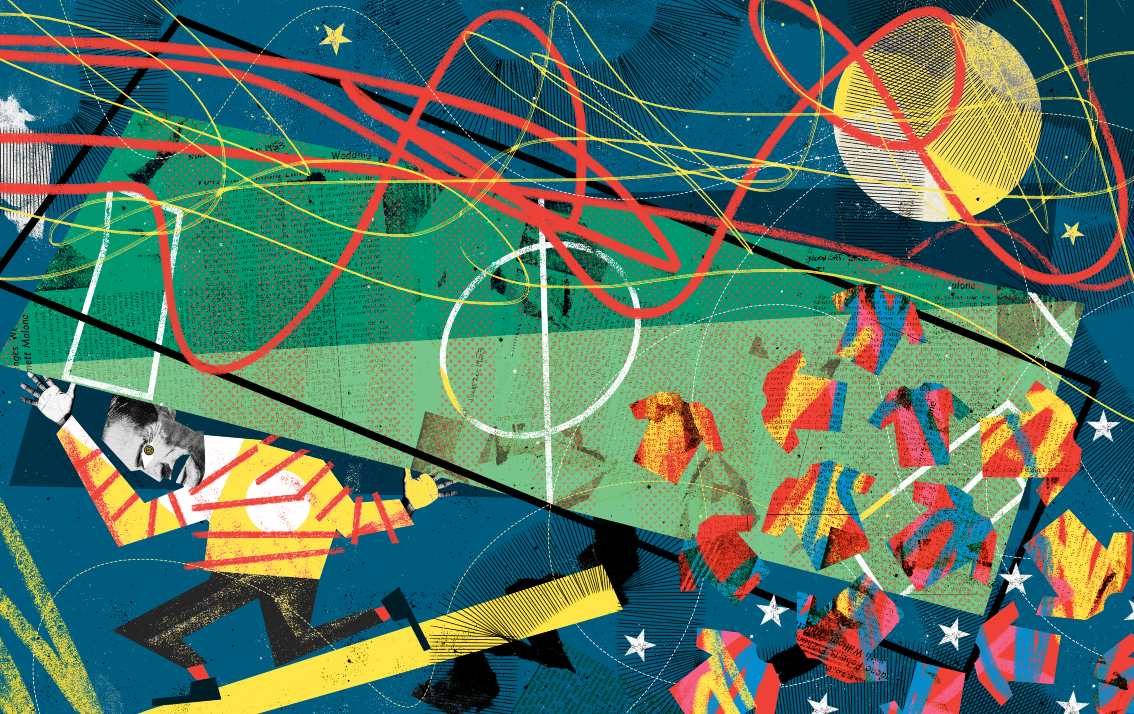Fantasy Premier League: the crazy history and inside story of the rise of FPL
The Fantasy Premier League juggernaut shows no signs of slowing down, with a host of new formats and outlets offering ever more choice. FFT investigates how FPL went mainstream...

This Fantasy Premier League feature appears in the August 2021 edition of FourFourTwo.
Order the new issue with free delivery here – just select 'Season Preview 2021' from the dropdown.
Subscribe to FourFourTwo today and save! You'll get 13 issues per year...
It must be the trickiest conflict for modern football fans. A Mo Salah, Harry Kane or Bruno Fernandes finds a gap inside your team’s penalty area: do you scream for defenders to intervene… or secretly hope he scores? Because that opposition hotshot is also your fantasy league captain – double points; perhaps even your Triple Captain. The question is: which team is more important?
For such a wildly accessible and increasingly huge game, fantasy football can really mess with your head. It’s not for the game-weak.
“You have to be ruthless,” says Rui Marques, who won major fantasy leagues before his move into ‘proper’ football. “I was third at the 2006 World Cup – my first big one. I was cheering against Portugal, because Bastian Schweinsteiger scored twice in the third-place play-off. I celebrated. It was against my own country, but you have to swallow your pride.”
The world’s best fantasy football player – maybe I was. Today, I’m average. If you ask Usain Bolt, he was the best and now he’s not. But I’m trying to win again.
Rui Marques, FPL expert and scout
Most of us have probably tried this simple but infuriating game – pick 15 players and amass points for every goal, assist, clean sheet and more. Many take it super seriously, though, and it’s been particularly intense over the past 18 months: as FourFourTwo can attest, fantasy football matters more when real life goes kaput.
Get FourFourTwo Newsletter
The best features, fun and footballing quizzes, straight to your inbox every week.
The official Fantasy Premier League game now boasts more than eight million players, which is over twice as many than in 2015/16 – but Premier League outfits are beginning to ban it from dressing rooms. This virtual sport is changing lives and causing issues.
One man who has indisputably benefited is Marques: the Mourinho of fantasy football (he’s Portuguese, was great, but – he readily admits – has lost his mojo lately). Originally an economist, Marques has since scouted for Estoril Praia – under Marco Silva – Sporting Kansas City and now Legia Warsaw, after discovering those player-spotting powers via fantasy football. He won the Mirror league in 2010 – a tasty £75,000 – then the Bild one in Germany as well. That’s multinational nous.
“The world’s best fantasy football player – maybe I was,” says Marques. He even sounds a bit Jose-like. “Now, I’m just a normal guy. I have the scouting job and some financial work, so it’s tough to maintain that level. To be a top guy, you need a strong pre-season, working late. Today, I’m average. If you ask Usain Bolt, he was the best and now he’s not. But I’m trying to win again.”
Fantasy take off
The rise of fantasy football worldwide has been remarkable, and certainly surprised the man who started it. Andrew Wainstein was hardly a tech-savvy Daniel Ek type, 30 years ago. Having stumbled upon the US fantasy sports concept, he considered a UK football version, and bought some envelopes.
“I guess you’d call it an old-school startup,” says Wainstein, who has also moved into life coaching recently. Fantasy football definitely changed his. “I didn’t have any money. I was still living at home, doing it in my sister’s old bedroom. I was just a football geek, but quite driven I suppose. I locked myself away for three months, designed the system and then started placing ads in football magazines – this was before FFT. I remember printing out reports on a Sunday night and taking them down to the post office in big sacks. It feels very archaic now.”
Then the media got involved, and it took off... in unlikely directions. Heard Three Lions a lot this summer? It began with Wainstein. The now legendary BBC show Fantasy Football League initially debuted on Radio 5 Live. “It was on Sunday mornings, hosted by Dominik Diamond, and I’d be a guest, as would David Baddiel and Frank Skinner,” he reveals.
The comedy duo leapfrogged Diamond for the TV version, and their iconic banter would popularise the pastime. Then the internet arrived, and Fantasy League was licensed internationally. It even helped to launch the web for some. Wainstein recalls one mid-90s customer who was unable to log in, and was baffled when asked if other websites worked. “He’d literally got online just to play fantasy football. He’d never been to any other sites.”
This might seem like a niche, geek-driven stat-fest, but fantasy football’s surge has attracted football agnostics, too. Take Kylie Mooney, who had moved from Australia to Ireland and joined a mini-league for a laugh.
“I was the least likely person to end up spending a good chunk of her time talking anything football-related,” she says. “Within two years, though, I was podcasting weekly about fantasy football.”
That podcast is 3 Amigos, and there’s a big audience for such broadcasts, in a variety of flavours. As she puts it, “the corners of the internet that house our most ardent fantasy football players are a unique space, where it’s completely normal to obsess for hours about a seemingly innocuous touch of a ball.”
Indeed, Mooney considers fantasy football “almost a sport itself”. Serious players devote hundreds of hours, and often run teams in numerous competitions. A whole cottage industry supports and reports on it, from websites and podcasts to the semi-mythical Ben Crellin, whose spreadsheets forecast fixture changes, double gameweeks and when to press that big Triple Captain button.
"It's all luck, tbh"
There are two principal types of fantasy football. Wainstein’s original version was the ‘draft’ game, which is making a comeback. That’s a mini-league featuring a pre-season auction, like an NBA or IPL draft, so every team is unique. It’s essentially just between mates, but good players go full Moneyball.
“Andy Murray plays our game and is super competitive, as you would imagine,” smiles Wainstein. “The first year he won Wimbledon in 2013, he tweeted after, ‘So pumped – got my fantasy auction tomorrow’. Not, ‘I’m so pumped, I’ve won Wimbledon…’”
Top sportspeople may have an edge here. Perhaps it’s the prep. England bowler Stuart Broad is a demon at the standard fantasy format, now dominated by Fantasy Premier League. In 2018, he topped one gameweek globally, beating six million people. But the competition continues to grow. FPL did to fantasy football what the Super League tried with regular football... only this takeover bid worked. Add a handy smartphone app, and you’ve got a snowballing phenomenon.
You’d struggle to predict who’s outstanding at it. Sheffield United’s Saudi owner Prince Abdullah is invariably there or thereabouts, and finished 194th overall in 2013. Vying for the title two years ago were the Norwegian chess wizard Magnus Carlsen – consistently one of the world’s best FPL players, putting his predictive strategy skills to extra-curricular use – and former Liverpool defender Nicky Tanner. The ’90s centre-half took time out to send FFT a full breakdown of his method: “It’s all luck, tbh.”
Fantasy football has become contentious for modern players, though. One man who’s interviewed several fantasy-loving pros is Ryan from long-running site FantasyYIRMA: a community that is hot on spotting hints. Aston Villa banned fantasy football altogether last season, after their attempts to hide Jack Grealish’s shin injury were scuppered when several staff dumped him from their teams.
“It probably is a conflict of interests,” says Ryan. “Diogo Jota sold Salah two days before a gameweek – he’s not playing. You imagine someone like Marcelo Bielsa, who’s probably scrutinising a thousand different players, probably has a team watching social media.”
FANTASY PREMIER LEAGUE Everything you need to know about FPL this season
Still, Ryan reckons pros should keep playing – at least here they’re spending downtime analysing tactics, opponents and potential talents. You can see how it leads to scouting, in a sport increasingly beholden to statistics.
“It upsets me if people say my background is Football Manager; fantasy football, it’s real life,” growls Rui Marques, who wrote a book about his exploits: The Unknown Champion. Not everyone understands. His Euro 2020 team had a terrible start: Timothy Castagne, Christian Eriksen... oof. “I was telling my wife. She said, ‘you’re a crying baby.’”
Still, fantasy football brings people together, via the FPL’s infinite, free-for-all mini-leagues. Tom Holmes is another fantasy beneficiary: he went from stand-up comedy to a job at Reading via a popular fantasy podcast, The Gaffer Tapes. Some of his mini-leagues are pretty diverse. “I’m in a league with Reading players, a few mates,” he says, “and Lord of the Rings fanatics who joined our mini-league after actor Dom Monaghan was on a show.”
Those tables can be torturous if you start badly, and the experts mess up too. Holmes is still haunted by selecting the wrong Ayew brother, “who played three minutes. The one I wanted scored, although it gave us a good episode name: Ayew Being Serious?”
It’s worse when you manage to persuade others to follow your foolishness. Mooney recalls “the Shane Duffy Triple Captain saga”. Brighton had a double gameweek, but Duffy is hardly Harry Kane. “He scored a paltry one point across two games, breaking hearts and creating trauma the community over.”
For less-than-ruthless fans, club loyalties and superstitions can hijack a fantasy team – even for the gurus. Ryan from FantasyYIRMA supports Arsenal, so boycotted Manchester United’s Robin van Persie – “the best fantasy player by miles” – while still advising readers to pick him. More seriously, he won’t captain anyone in Friday night fixtures, for his own well-being. “If he does s**t, it ruins the whole weekend for me.”
That became a real issue during lockdown. With every game screened on TV, it extended the agony. “There’s a theme this year, lots of people on Twitter making announcements: ‘I’ve had enough, I’m gonna stop playing…’ Then they were back again.”

Like the real game, fantasy football can stir much emotion. Holmes of The Gaffer Tapes remembers antagonising one online fantasy whizz whose followers “came after us in their droves, death threats and everything. I got told by someone that I think had the handle @FPLCauliflower that he was going to beat me up. Some of them are pretty peculiar.”
And their research methods can be dubious. “I heard a story about somebody harassing a player’s family to find out if he was likely to play that weekend,” says Holmes. “When you’re doing that, it’s time to chill out and find another hobby. Try Boggle.”
The more seriously you take the game, the more stressful it becomes. As FFT learned last season, mini-league basement-dwelling does nowt to help self-esteem. That pressure becomes more acute the higher-profile you are. Mooney and the 3 Amigos dedicated a chunk of their season finale to the stresses of fantasy life last term.
“There’s undoubtedly a different level of pressure you feel to succeed if you’re giving advice or commentary about the game,” she says. “I think that comes from ourselves.” You can imagine misogynist geezers scouring female broadcasters’ fantasy results for rant fuel, too. Mooney took part in an FPL-backed series about that subject, but thankfully this diverse community largely self-polices. “Trolls exist,” she admits, “but on the whole it’s an incredibly inclusive group.”
The darker side
FPL life can feel solitary without interaction, though, and some get in deep. A UK journal study last year advised that “avid participants displayed an increased likelihood of internet addiction”, and then there’s the money issue. Away from the free (but merch-plugging) FPL there are paid games, betting links and one variation that went very dark.
“Fantasy football is definitely a gateway,” explains Jack Clothier, a keen punter with a claim to footy-gambling fame: his record label, Alcopop, was funded by a successful wager on Lomana LuaLua hitting the net for Portsmouth. Finding FPL limited, Clothier moved onto Football Index, the ‘football stock exchange’ where investors receive dividends when their players thrive, rather than points. Immensely popular, the market then crashed earlier this year, with FI’s licence suspended and many suffering massive losses.
“It’s gambling,” he continues. “I’ve seen in the community about marriage break-ups, and people admitting how much they’ve lost on Football Index saying, ‘I can’t look my own family in the eye – I’ve lost everything.’ Many have been wise after the event about it.”
As he suggests, FPL’s simple format can get “very dull” for serious players, so plenty are now switching to the draft game with its live auction (Wainstein says it’s poker-like) and customisable rules. There’s an FPL version, though the punkier Clothier favoured a now defunct offering called Dugout FC, where players could “leave offensive messages to opponents on your advertising hoardings”.
Wainstein’s site, fantasyleague.com, also fully focuses on the draft game, which does seem more sociable, post-lockdowns, with its pre-season auction party. So, donning his other hat, would a life coach recommend playing fantasy football?
“Somewhere where people can be sociable and interact with others,” he ponders. “That’s probably a healthy thing.”
Just be careful who you captain.
Subscribe to FourFourTwo today! Guarantee the finest football stories and interviews dropping on your doorstep first every month.
NOW READ
FPL 27 essential Fantasy Premier League tips from old winners and experts
FPL TIPS The top 30 Fantasy Premier League players from last season
A long-serving FourFourTwo contributor – first piece, Peter Kay on the John Smiths “Ave It!” ad, 2002 – Si Hawkins has reported for FFT from Dubai and New York to Norway and Swindon, talked football with Cantona, Lineker and the Chuckle Brothers, and once attempted football-based stand-up comedy, with predictable results. Elsewhere, Si has written for The Guardian, BBC, New European, Vice, numerous in-flight publications, and – perhaps most prestigiously – the Leyton Orient Matchday Magazine.

